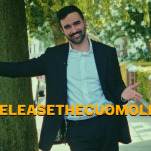Young poets call out prestigious contests for barring undocumented writers
When Marcelo Hernandez Castillo first got serious about poetry as a teenager, he hoped, naturally, to share his work with the world. But he soon faced a sobering fact: an entire population of aspiring young poets like him have been effectively barred from the poetry establishment in the U.S.
Hernandez Castillo, though raised in Northern California, was, at the time, undocumented, having arrived with his parents from Zacatecas, Mexico as a small child. “When you’re undocumented, the first thing you look at with anything are the legal requirements,” he says. “I immediately realized that a lot of the contests and presses require citizenship.”
Hernandez Castillo, now 27, gained his legal U.S. residence last year. But now he and fellow poets Javier Zamora and Christopher Soto, both 24, have formed a group to tear down these walls: the Undocupoets.
The mission? End citizenship-based discrimination, first in first-book contests, a brass ring in the poetry world that could lead to publication by bigger companies, and eventually marquee opportunities like NEA grants, Guggenheim Fellowships, and the Pulitzer Prize.
“We must strive, as a poetry community, to allow ALL of our comrades the same opportunities that documented poets are afforded.” — the Undocupoets’ current petition
The three writers have now circulated a petition first published online in the journal Apogee. It calls for what’s basically a baby step towards inclusion—extending entry rights in major contests to those under Temporary Protected Status (TPS) or DACA, a program for those who arrived undocumented as children.
“We must strive, as a poetry community, to allow ALL of our comrades the same opportunities that documented poets are afforded,” they wrote in the petition. “No poet should have their opportunities limited because of their immigration status!”
They’ve collected more than 400 signatures on the petition so far, including big-for-poetry names who teach in vaunted programs at Harvard, Notre Dame, and NYU. “To have 400-plus people in solidarity might seem like a small number for any other kind of community, like the broader Latino community,” says Hernandez Castillo. “But for the poetry community, that’s a big number.”
So, yes, as it turns out for those of us who might like poetry, but live outside of its cloistered walls, it turns out that poetry contests do not, in fact, just judge entries based on the strength of the work alone. If you’re confused, well, so are many other poets themselves.
“There have been multiple times where I have run into people in this process where they’ve said, ‘Oh, geez, I’ve never thought about that,’” says Hernandez Castillo, of his discussions with the community about contests’ citizenship requirements. “It’s just showed us how little people are thinking about it, which means how little [poetry] presses are thinking of it. They don’t know the weight of that and how it’s bearing on undocumented writers.”
-

-

-

-

-

-

-

-

-

-

-

-

-

-

-

-

-

-

-

-

-

-

-

-

-

-

-

-

-

-

-

-

-

-

-

-

-

-

-

-

-

-

-

-

-

-

-

-

-

-

-

-

-

-

-

-

-

-

-

-

-

-

-

-

-

-

-

-

-

-

-

-

-

-

-

-

-

-

-

-

-

-

-

-

-

-

-

-

-

-

-

-

-

-

-

-

-

-

-

-

-

-

-

-

-

-

-

-












































































































